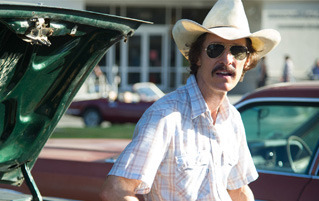6 Movies Based on a True Story That Left Out Important Stuff

Over the years, we've poked fun at a lot of "based on a true story" movies that turned out to be bullshit. But then we thought that maybe we should stop giving Hollywood shit for embellishing history a bit if it lets them tell a slightly better story. So instead, we decided to give Hollywood shit for leaving out mind-blowing details out of their "based on a true story" movies that would have made them even better:
The King's Speech: George VI Was Kind Of a Shitty King (Also, His Brother Was a Nazi-Lover)

The Movie:
Prince Albert seeks the help of a speech therapist to overcome his horrible stutter brought on by the stresses of being a British royal mixed in with teasing by his dickish older brother. In the end, the prince is crowned King George VI, befriends Winston Churchill, and eloquently rallies the nation against Hitler, whom he suspected of being a bad egg before it was cool.

What They Left Out:
In the movie, Albert's brother Edward is portrayed as a harmless, malingering dickhole, who at one point expresses half-ass support of Hitler's government. In real life, however, Edward's love for fascism was all-ass. Not only did he personally meet with his man-crush Hitler, he dined with Rudolf Hess and openly talked about overthrowing Albert after Adolf " the Americans."
As for the real George VI, for the longest time, he was in favor of appeasement when it came to dealing with the Fuhrer. After Neville Chamberlain returned from Munich in 1938, having allowed Nazi Germany to annex a chunk of Czechoslovakia, George and his wife were so delighted that they invited Chamberlain to Buckingham Palace to celebrate what a genius idea that was. Even after the shit (meaning the German army) hit the fan (meaning Poland), George VI opposed making Churchill the Prime Minister, assumingly because of Churchill's aggressive "let's gouge Hitler's eyes out" platform.

Eventually, George understood the danger posed by Hitler, and started working closely with Churchill, but the operative word is "eventually." He wasn't a revolutionary thinker years ahead of his time, and he didn't always make good decisions. He was a man who had to grow into his role as king, and maybe if The King's Speech had focused on that, the movie would have won all the Oscars, instead of just most of them.
Dallas Buyers Club: Ron Woodroof Wasn't a "Cowboy," but Was Bisexual

The Movie:
Matthew McConaughey plays an unshaven "cowboy" named Ron Woodroof who loves the ladies so much he gets AIDS from fucking a junkie prostitute. If that wasn't enough to establish the character's throbbing heterosexuality, he also spends most of the movie overcoming his homophobia towards the gay people who buy the FDA-unapproved AIDS medication he smuggles in from Mexico.

We'd say it was like the anti-Milk if both movies weren't shameless Oscar bait.
What They Left Out:
Far from being a rootin'-tootin' cowboy, Woodroof is described by the people that actually knew him as a quiet, neatly-dressed man who looked like an accountant. Bill Minutaglio, who interviewed Woodroof in 1992, recalls that even in the months leading to his death, he never stopped making an effort to look presentable.

Another thing that Dallas Buyers Club apparently took a few liberties with was portraying Ron as straight, which he clearly was not. It's most likely that Ron was bisexual, as he did have sex with the occasional woman while also being active in the local gay community. The point, however, is that the man definitely touched a fair share of penises that didn't belong to him, and wouldn't you rather see that story?
Maybe not the touching of penises but rather a story about a bisexual accountant-lookalike who becomes a smuggler, which is a great plot on its own because when bad things happen to you, it's not always a learning opportunity meant to help you overcome a personal flaw. The story of the real Woodroof is that of a complex, stereotype-defying man who simply got a raw deal and then went on to deal with it. Isn't that enough?

The Imitation Game: Alan Turing Was Also a Badass Athlete

The Movie:
The Imitation Game is the story about genius mathematician Alan Turing, portrayed in the movie as a cold, Mr. Spock-like figure (Benedict Cumberbatch, playing him as an undercover Sherlock Holmes), who breaks the Enigma code for the Allies and is rewarded for his effort by having the British government chemically cut off his balls for being gay.

What They Left Out:
At age 13, Turing was supposed to attend his first day at the Sherborne School, but had no feasible way of getting there because of the general strike of 1926. Fortunately, even before breaking the Enigma code, Turing had a tendency to eat impossibility and shit out awesomeness so, left with no other choice, young Turing decided to bike to Sherborne ... located more than 60 miles from his home.
It wasn't exactly uncharacteristic of him. In his later life, Turing would set various running records at the Walton Athletic Club, and almost qualified for the 1948 Olympics as a marathon runner. But of course the movie doesn't touch upon any of that because "lol, a nerd who's good at sports?!"

Though to be fair, Turing did live up to one nerd stereotype: He was quirky as all fuck. In the summer, to ward off hay fever, he actually used to cycle to work while wearing a gas mask, and, according to his brother, he chained his mug to the radiator to stop people from using it, possibly as a joke, or possibly because he was gloriously eccentric. Our money is on the latter, seeing as Turing also reportedly buried some silver in a field, fearing a German invasion of the U.K.
Malcolm X: Malcolm Was Shunned by His Own Family ... and Muhammad Ali

The Movie:
Malcolm X tells the true story of the titular civil rights firebrand who goes from a two-bit hustler to a leading figure in the Nation of Islam. However, he eventually grows disillusioned with the organization and distances himself from it, earning him hate and scorn from the people he considered his brothers.
What They Left Out:
When we say that Malcolm X was hated by his "brothers," we mean that in the literal "shot from the same yogurt cannon" sense. Malcolm was actually the middle child out of seven boys sired by his father, with some of them being involved with the NOI before their more famous sibling.

In the movie, Malcolm is introduced to literature and Islam via a friend called Baines. But in real life, he was first drawn to the NOI by his younger brother Reginald. This unfortunately became a source of great sadness for Malcolm after he broke off from the group, causing his family to declare him a dangerous charlatan that had to be kept away from true believers. That would've been one hell of an emotional noogie if they only said it to his face, but then they made it public. One time, Malcolm's brother Philbert actually attacked him in an official NOI newspaper, comparing Malcolm to Judas.
Another interesting element missing from the movie was Malcolm's relationship with legendary boxer Muhammad Ali. Ali and Malcolm were actually close friends, but after the latter turned away from the NOI, their relationship soured almost instantly. At one point, when they were both touring Africa, Ali snubbed Malcolm with visible disgust, publically ending their long-standing friendship in the bitchiest way possible.

Zulu (1964): The Entire Regiment Was a Lovable Bunch of Colorful Misfits

The Movie:
The first major film to introduce the awesomeness of Michael Caine to the world tells the real story of 150 British soldiers holding off an entire army of Zulu warriors during the Battle of Rorke's Drift in 1879. If you've never seen it, think 300 with more shirts and manners.

What They Left Out:
First of all, Michael Caine's character, Lieutenant Gonville Bromhead, wasn't a chiseled 19th-century action hero but an overlooked soldier who, before the battle, was given important jobs like standing guard by the supplies. He was also deaf as a post, and generally sounds like a stereotypical zero-to-hero protagonist that a Hollywood screenwriter would come up with if he was working on a deadline. Then there was Colour Sergeant Bourne, portrayed in the movie as a tough and brawny middle-aged officer. In real life, though, the 24-year-old Bourne was only 5 feet 6 inches tall and was nicknamed "the kid" by his friends, because every story about a ragtag group of misfits needs their own shrimp. It's just weird that the movie didn't want to tell that story.

Finally, there is Private Henry Hook, the movie's pathetic drunk who heroically redeems himself by saving his fellow soldiers from a field hospital. That second part really did happen: Hook did show tremendous bravery defending the hospital, but he did it stone-cold sober. He was actually a Methodist preacher and teetotaler with a perfect record who, by the way, also took a Zulu spear to the helmet during the battle. But at some point they decided it was more inspirational if he was a drunk instead, so enjoy the rewriting of your life story, preacherman!
The King And I: Anna Was a Brilliant, Mixed-Race Con Artist

The Movie:
The famous story of Anna Leonowens, the resolute, sophisticated governess who taught English to the children of the King of Siam (modern Thailand), has gotten told over and over again. It was a best-selling novel (Anna and the King of Siam), then became a long-running Rodgers & Hammerstein Broadway musical (The King and I). But the most famous recounting of her based-on-true-events story is the 1956 film, possibly the most beloved family film to ever feature characters in full yellowface.

What They Left Out:
Contrary to how movies always depict her, the real Anna was half-Indian (her father was a private in the army who married an Indian woman) and, due to her heritage, she was considered very low class. That's why, after her husband died, she decided to con her way into a better life.
First, she moved to Singapore, where nobody knew her, and passed herself off as the posh daughter of a major, and the widow of a high-ranking officer. She also said she'd been born in Wales instead of India to explain her dark complexion, which frankly puts into question everything we thought we knew about Wales and its people.

Most importantly, Anna completely changed her voice, only speaking with a made-up, sophisticated British accent, something that came easily to her seeing as she was a genius with languages. Reportedly, she could speak Hindi, Marathi, Persian, and Sanskrit, which had to contribute to her being chosen as the teacher in the service of King Mongkut.
Oh, and her story didn't end there. After Thailand, Anna traveled all over the world promoting women's rights and various social issues. Towards the end of her life, she settled in Halifax, Canada, where she set up societies to educate women, and campaigned for suffrage. Not bad for someone who began her career on a mountain of lies.

But who wants to hear about bringing learnin' to women?
For more ridiculous things movies left out, check out 6 'Based on a True Story' Movies with Unpleasant Epilogues and 7 Movies Based on a True Story (That Are Complete Bullshit).
Are you on reddit? Check it: We are too! Click on over to our best of Cracked subreddit.
Remind everyone that the truth can be much cooler than fiction. Click the Facebook 'share' button below.
